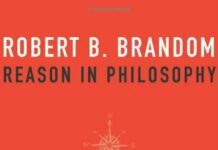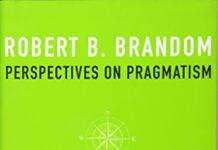
Ebook Info
- Published: 2000
- Number of pages: 432 pages
- Format: PDF
- File Size: 21.20 MB
- Authors: Robert B. Brandom
Description
Essays, written by thirteen of the most distinguished living philosophers, together with Rorty’s substantial replies to each, and other new material by him, offer by far the most thorough and thoughtful discussion of the work of the thinker who has been called “the most interesting philosopher alive.”
User’s Reviews
Editorial Reviews: Review “More famously than any philosopher writing within the Anglo-American dispensation since William James and John Dewey, Richard Rorty has transported his inherited intellectual preoccupations from, in Kant’s distinction, school philosophy to world philosophy. To assess this progress, the present volume brings together a formidable selection of the most interesting and influential philosophers now at issue in the analytical sphere of philosophy, to each of whom Rorty responds resourcefully and forcefully. The result is that remarkable thing, a book that does superbly everything it promises.” Stanley Cavell, Harvard University Book Description Thirteen of Rorty’s distinguished contemporaries assess Rorty’s arguments for revising our philosophical conceptions of truth, reality, objectivity & justification – contributors include: Jurgen Habermas, Hilary Putnam, & Daniel Dennett to name a few. From the Inside Flap Thirteen of the most distinguished living philosophers – including Donald Davidson, Jürgen Habermas, Hilary Putnam, John McDowell, Jacques Bouveresse, and Daniel Dennett – assess Richard Rorty’s arguments for revising our philosophical conceptions of truth, reality, objectivity, and justification. These essays, together with Rorty’s substantial replies to each, and other new material by him, offer by far the most thorough and thoughtful discussion of the work of the thinker who has been called ‘the most interesting philosopher alive.’ From the Back Cover Thirteen of the most distinguished living philosophers – including Donald Davidson, Jürgen Habermas, Hilary Putnam, John McDowell, Jacques Bouveresse, and Daniel Dennett – assess Richard Rorty’s arguments for revising our philosophical conceptions of truth, reality, objectivity, and justification. These essays, together with Rorty’s substantial replies to each, and other new material by him, offer by far the most thorough and thoughtful discussion of the work of the thinker who has been called ‘the most interesting philosopher alive.’ About the Author Robert B. Brandom is Distinguished Service Professor of Philosophy at the University of Pittsburgh. His 1977 Princeton PhD thesis on pragmatism and the philosophy of language was supervised by Richard Rorty. He is author of Making it Explicit (1994), an extension of his thesis. Read more
Reviews from Amazon users which were colected at the time this book was published on the website:
⭐Excellent collection and great format with the author’s responses, which go beyond the points raised and add valuable insights.
⭐Great reading experience. On time delivery. Great structure gets Rorty at his creative best challenged by his critics to open the door to postmodern pragmatism. Enjoy.
⭐Take the single most entertaining and engaging philosopher that the academy can today boast, add a few colleagues who have pointed (and sometimes passionate) arguments to pursue with him and serve at the hands of one of his protégés – and you have Rorty and His Critics edited by Robert B Brandom.This book is very stimulating, enormously erudite and not a little complicated. Here Rorty is hauled over the hot coals and its his task to defend himself against (and, occasionally, to further expedite) the arguments of his interlocutors; these figures include such heavyweights as Habermas, Davidson, Dennett, and Jacques Bouveresse. They argue and debate back and forth over various things that the interlocutors have at issue with Rorty. These include the status of “truth” as against “justification before ones peers”, the supposed inescapability from “reality” and, in the best piece from the book, written by Bjorn Ramberg, what a “Post-Ontological Philosophy of Mind” might be and, indeed, might lead to. In response to this latter piece Rorty seems to bend his pragmatic line just a bit closer to the realist one in what I hope might become a classic quote of his: “What is true in pragmatism is that what you talk about depends not on what is real but on what it pays you to talk about. What is true in realism is that most of what you talk about you get right.” The book begins with a helpful introduction by the editor (a former graduate student supervised by Rorty with his own chapter engaging Rorty in the book as well) and a paper by Rorty which argues that justification is more useful than “truth” since at least you can recognise the former when you have it (and what you can’t recognise when you have it is useless anyway).The collection of questions as arguments put to Rorty and his responses seems, to me, to make Rorty work at his thinking. It makes him explicate and also explain his pragmatic turn of thought in response to a new set of papers and I, for one, am thankful for that. The book is hard going. Those not used to philosophical debate or microscopically logical argument where you can trap your opponent in seeming errors which undercut her thesis are going to find themselves quickly caught up in something which seems to be overpowering them. This is a book that should be read at leisure, poured over, taken in deeply and mused upon. It will require not a little effort. At the end of the process Rorty still does not think that there is a “Reality” out there for us to get right “Because there are no norms for talking about it”. But I, for one, am glad that I have had the opportunity to read this book and it has made me sharpen up my own thinking too.PoSTmodERnFoOL
⭐I am not a big fan of Rorty’s work, but this volume is excellent. It contains articles by top-notch philosophers (with Rorty’s responses) that hits on topics ranging from truth and objectivity to epistemology and pragmatism.I consider the most important articles as the following: Davidson, “Truth Rehabilitated,” Putnam, “RR on Reality and Justification,” (excellent); McDowell, “Towards Rehabilitating Objectivity,” (excellent); Brandom, “Vocabularies of Pragmatism,” M. Williams, “Epistemology and the Mirror of Nature,” Conant, “Freedom, Cruelty, and Truth: Rorty versus Orwell.”I highly recommend this anthology.
⭐I received the book in time, everything is ok. Just had some things wrote on it but, well, I was buying a used book, I wasn’t excepting that it would be imaculaded. So, perfect!
Keywords
Free Download Rorty and His Critics 1st Edition in PDF format
Rorty and His Critics 1st Edition PDF Free Download
Download Rorty and His Critics 1st Edition 2000 PDF Free
Rorty and His Critics 1st Edition 2000 PDF Free Download
Download Rorty and His Critics 1st Edition PDF
Free Download Ebook Rorty and His Critics 1st Edition



